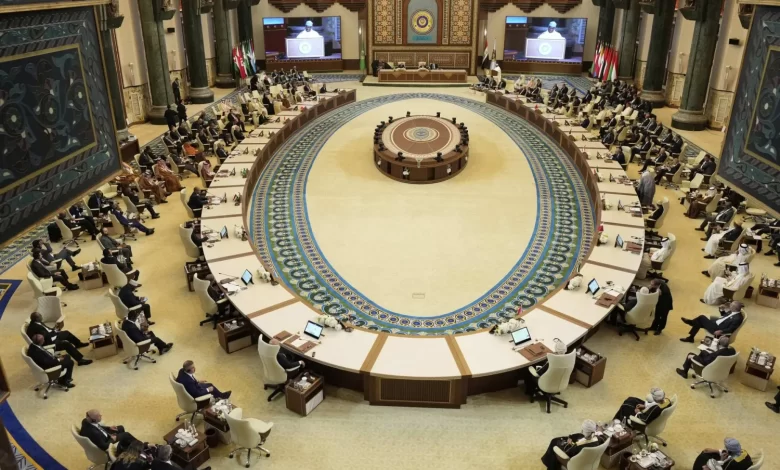“Baghdad Summit”… “Parallel Entities” Threaten Sudan and Yemen

Sudan Events – Agencies
Among the urgent issues addressed by leaders during the Arab Summit in Baghdad was a notable discussion about the “parallel entities” that threaten states, with Sudan and Yemen emerging as examples of countries facing depletion and instability.
In Sudan, the most recent war broke out in April 2023, leading to the displacement of more than 12 million Sudanese people both internally and externally.
In Yemen, the Houthis continue to obstruct the political process, threaten navigation in the Red Sea, disrupt the functions of legitimate institutions, and refuse to engage in a peaceful political settlement for a crisis that has exceeded a decade.
“Militia Arrogance”
During his speech at the 34th Arab League Summit on Saturday, Chairman of the Yemeni Presidential Leadership Council, Rashad Al-Alimi, called for decisive measures to enhance Yemen’s ability to confront the “arrogance of militias,” including the “sincere implementation of the Arab League Council’s decision at the level of permanent representatives to classify the Houthi militia as a foreign terrorist organization.”
Al-Alimi attacked the “Houthi group,” saying it “has committed every conceivable crime—from targeting ports and airports, blowing up homes and mosques, to stealing humanitarian aid, kidnapping aid workers, planting landmines, recruiting children, erasing identity and livelihoods, as well as committing horrific human rights violations.”
United Nations Secretary-General António Guterres said at the “Baghdad Summit” that “Red Sea attacks are destroying the global economy,” calling for a “Yemeni-Yemeni dialogue to ensure stability.”
The Decisions of Peace and War
He emphasized that “the collective stance rejecting the Houthis’ behavior, along with the classification decision, confirms our commitment to the Charter of the Arab League and the United Nations. It also sends a decisive message to all militias that challenge our states’ exclusive right to possess arms and make decisions of peace and war.”
Addressing Arab leaders, he said: “For more than 10 years, our Yemeni people have been fighting an existential battle against the Houthi militia and its backers,” adding: “Today, Yemenis look to your support and fraternal positions. We are more determined than ever to end the suffering and bring down this cross-border project and its agenda, after exhausting all efforts to persuade this group to abandon its racist approach and respond to the popular will and international legitimacy.”
Al-Alimi expressed his gratitude to the coalition supporting legitimacy, led by Saudi Arabia and the United Arab Emirates, affirming that “they deserve credit for the legendary resilience of our great Yemeni people, for alleviating their suffering, and for preserving the cohesion of national institutions over the past years.”
Parallel Governments
Regarding Sudan, Egyptian President Abdel Fattah El-Sisi reaffirmed his country’s rejection of “any attempts to establish parallel governments to the legitimate authority.”
During his speech at the Arab Summit, El-Sisi said, “Brotherly Sudan is at a dangerous crossroads that threatens its unity and stability, which requires urgent action to ensure a ceasefire.”
He emphasized “the need to ensure the delivery of humanitarian aid, preserve the unity of Sudanese land and national institutions, and reject any attempts to form parallel governments to the legitimate authority.”
Meanwhile, Sudan’s Deputy Sovereignty Council Chairman, Ibrahim Jaber, stated at the “Baghdad Summit” that “the Arab region is facing significant challenges, including the escalation of military conflicts,” particularly in Sudan, where “the Rapid Support Forces are targeting all the gains of the Sudanese people.”
Jaber expressed support for “a ceasefire initiative accompanied by a full withdrawal of the Rapid Support Forces,” affirming his support for a “comprehensive Sudanese dialogue paving the way for elections,” and calling on “Arab countries to contribute to rebuilding Sudan and rehabilitating its infrastructure.”
In September 2024, the World Health Organization announced that the confirmed death toll from the ongoing war in Sudan since 2023 had exceeded 20,000. Other studies estimate the number of deaths to have surpassed 150,000, including those killed by violence, starvation, and disease caused by the war.
The war has destroyed critical infrastructure such as bridges and dams, as well as electricity, water, healthcare, and education facilities.
According to unofficial estimates, the losses resulting from the destruction of these facilities range between $120 billion and $150 billion.



